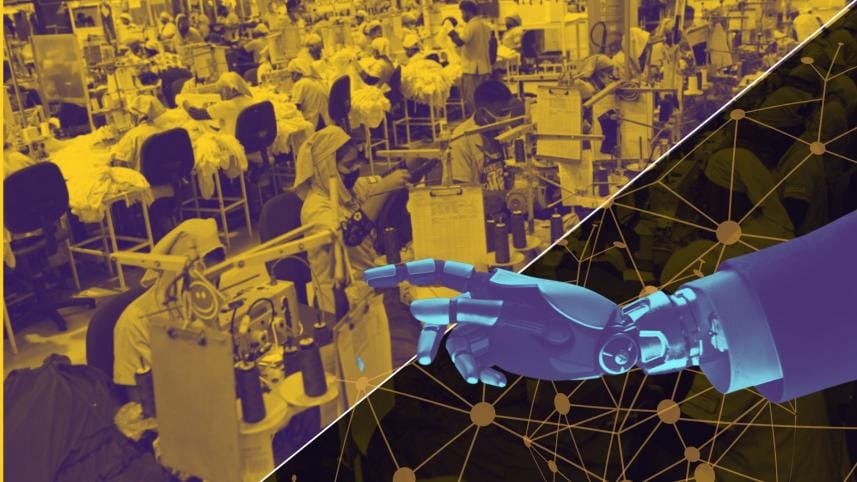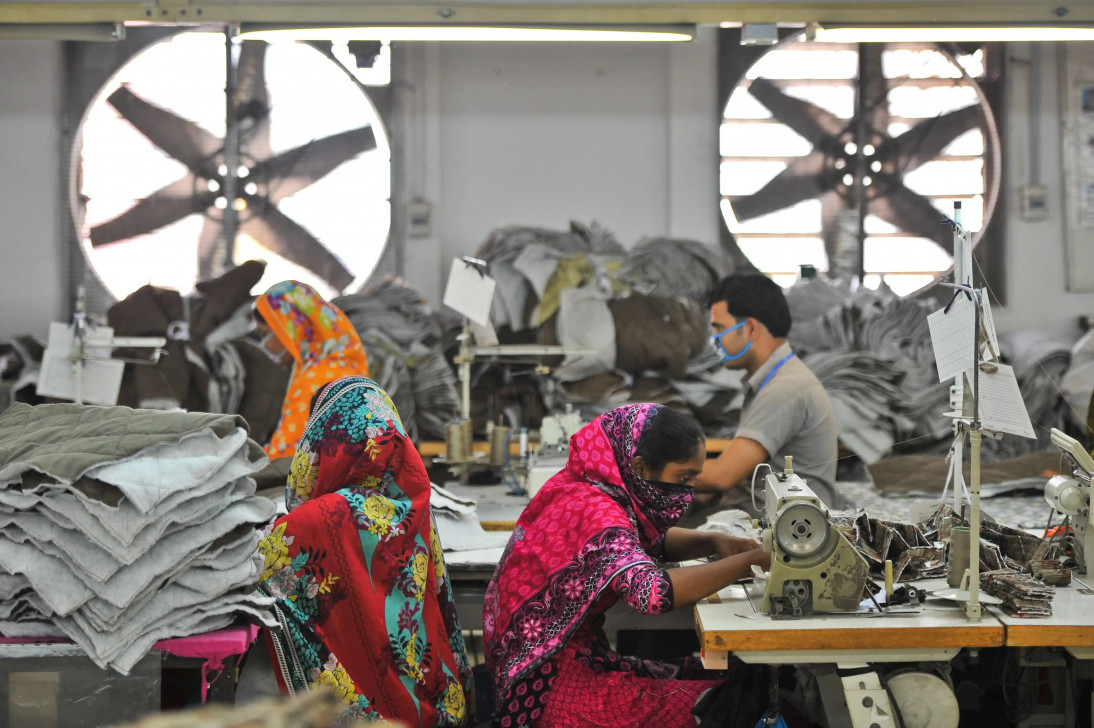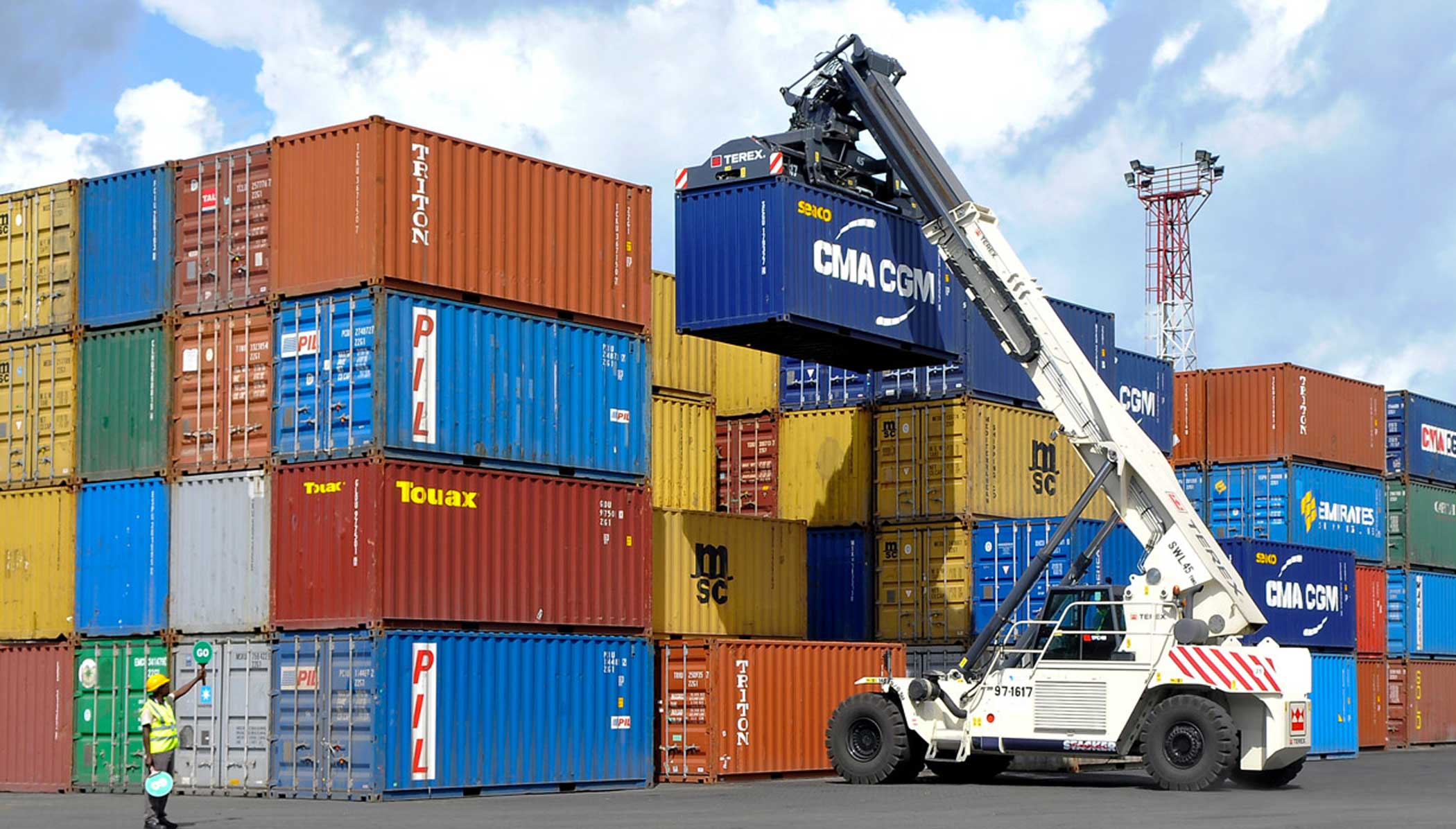Utilising AI in Bangladesh’s RMG sector

Artificial intelligence (AI) offers immense potential to transform Bangladesh's ready-made garment (RMG) sector, enabling enhanced productivity, improved quality, and sustainable practices, while simultaneously addressing inefficiencies, streamlining processes, and increasing competitiveness. AI-powered systems can revolutionise the production process by enabling real-time monitoring and optimising factory operations. Machines equipped with AI can predict potential failures in equipment, cutting costly downtime and ensuring uninterrupted production. Additionally, AI-driven robotics can assist in repetitive tasks such as fabric-cutting, stitching, and packaging, reducing the time and cost associated with human labour. Human errors will also be minimised leading to the overall improvement of product quality.
Besides, AI technologies, such as image recognition systems, can inspect RMG products with precision, detecting flaws in stitching, colour or patterns. By ensuring that only high quality products reach international buyers, these systems can help safeguard Bangladesh's reputation as a reliable supplier. This technological edge can play a pivotal role in retaining the existing customer base and attracting new ones in an increasingly quality-conscious market.
AI-powered analytics can also provide real-time insights into supply chain dynamics, allowing manufacturers to predict disruptions and make data-driven decisions. For instance, if a delay in raw material shipments is anticipated, AI tools can recommend alternative suppliers, ensuring that production schedules remain intact. By forecasting demand more accurately, manufacturers can also avoid overproduction and manage inventory efficiently, reducing waste and aligning with just-in-time manufacturing principles.
Furthermore, AI can contribute to sustainable practices by optimising resource usage, such as calculating fabric layouts to minimise waste or monitoring energy and water consumption in factories. These measures will reduce environmental impact and also appeal to global buyers, who are increasingly seeking eco-friendly products.
In addition to streamlining operations, AI has the potential to transform customer engagement. By analysing consumer behaviour, AI tools can identify trends and preferences, enabling manufacturers to design products tailored to market demands. AI-powered online platforms can enhance the shopping experience, offering personalised recommendations and improving customer satisfaction. These innovations can help Bangladeshi manufacturers establish stronger connections with international buyers and boost sales.
Worker safety and productivity are other areas where AI could bring about meaningful change. AI-driven sensors can monitor factory conditions, detecting hazards such as gas leaks or structural vulnerabilities and ensuring swift action to prevent accidents. Wearable AI devices can track worker health and performance, providing data to improve workplace safety and efficiency, as well as protecting workers and creating a more productive and motivated workforce.
Using AI technologies, manufacturers can make Bangladeshi garment products more competitive in global markets and attract foreign investment, as international brands increasingly prioritise partnerships with technologically advanced suppliers. However, the road to AI integration is not without challenges. One of the most significant concerns is the potential for job displacement, particularly among low-skilled workers who form the backbone of the industry. Automation of repetitive tasks could lead to reduced demand for manual labour, raising fears about unemployment in a sector that provides livelihoods to millions. Addressing this issue requires a proactive approach, including the implementation of reskilling programmes to prepare workers for technology-driven roles. By equipping the workforce with new skills, the industry can create opportunities for employment in areas such as data analysis, programming, and machine maintenance.
Another challenge is the high cost of adopting AI technologies, which includes expenses for equipment, software, and training. For smaller manufacturers, these upfront investments may seem prohibitive. Government support in the form of subsidies, tax breaks, and low-interest loans could play a crucial role in making AI adoption more accessible. Policymakers must also establish a regulatory framework to encourage research and development in AI applications tailored to the needs of the RMG sector. However, while using AI technologies, manufacturers must ensure that robust safeguards are in place to protect sensitive information, both within their operations and in customer interactions. Building trust in the technology is essential for its widespread adoption.
Resistance to change is another hurdle that must be overcome. Many stakeholders in the RMG sector may be unfamiliar with AI or sceptical of its benefits. Demonstrating the tangible advantages of AI through pilot projects and success stories can help build confidence and encourage broader adoption.
The path forward requires a collaborative effort between the government, industry stakeholders, and technology providers. Policymakers must create an enabling environment through supportive policies and incentives, while manufacturers need to invest in upskilling their workforce and exploring partnerships with technology firms. A phased approach to AI integration, starting with pilot projects and gradual scale-up, can help mitigate risks and ensure a smooth transition.
Mostafiz Uddin is the managing director of Denim Expert Limited. He is also the founder and CEO of Bangladesh Denim Expo and Bangladesh Apparel Exchange (BAE).
Views expressed in this article are the author's own.
Follow The Daily Star Opinion on Facebook for the latest opinions, commentaries and analyses by experts and professionals. To contribute your article or letter to The Daily Star Opinion, see our guidelines for submission.




 For all latest news, follow The Daily Star's Google News channel.
For all latest news, follow The Daily Star's Google News channel. 



Comments